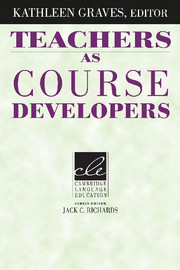Book contents
- Frontmatter
- Contents
- Contributors
- Series editor's preface
- Preface
- Acknowledgments
- 1 Teachers as course developers
- 2 A framework of course development processes
- 3 Designing workplace ESOL courses for Chinese health-care workers at a Boston nursing home
- 4 Designing a seventh-grade social studies course for ESL students at an international school
- 5 Designing an EAP course for postgraduate students in Ecuador
- 6 Designing a writing component for teen courses at a Brazilian language institute
- 7 Planning an advanced listening comprehension elective for Japanese college students
- 8 A curriculum framework for corporate language programs
- Further reading
- Index
Series editor's preface
Published online by Cambridge University Press: 18 December 2009
- Frontmatter
- Contents
- Contributors
- Series editor's preface
- Preface
- Acknowledgments
- 1 Teachers as course developers
- 2 A framework of course development processes
- 3 Designing workplace ESOL courses for Chinese health-care workers at a Boston nursing home
- 4 Designing a seventh-grade social studies course for ESL students at an international school
- 5 Designing an EAP course for postgraduate students in Ecuador
- 6 Designing a writing component for teen courses at a Brazilian language institute
- 7 Planning an advanced listening comprehension elective for Japanese college students
- 8 A curriculum framework for corporate language programs
- Further reading
- Index
Summary
Teachers as Course Developers presents an insider's view of what course development involves. The contributors are classroom teachers, and each presents a different though complementary story about the kinds of problems faced in designing a course and how those problems can be solved.
Graves uses a framework of course design processes in setting the schema for the book and effectively uses that framework to show how these teachers responded to specific issues in course design and the kind of decision making they used to resolve problems. What is likely to be of most interest to readers, therefore, is not the specific solutions described or the details of the particular course developed, but the information the contributors give about framing the problem they faced, posing questions, gathering information and resources, and drawing on theory and experience, as well as the processes of syllabus development, teaching, and evaluation they used. The teachers' stories emphasize that course design is not necessarily the orderly linear process which is often described in textbooks of curriculum theory. Different teachers begin the process of curriculum development from various starting points, problematize their task in different ways, and use different strategies to achieve their goals.
Teachers and teacher educators will therefore find this book to be a valuable complement to existing texts on course design in language teaching.
- Type
- Chapter
- Information
- Teachers as Course Developers , pp. viiiPublisher: Cambridge University PressPrint publication year: 1996

